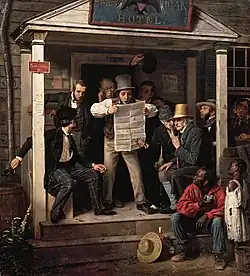Albert Gallatin
.jpg)
Abraham Alfonse Albert Gallatin (January 29, 1761 – August 12, 1849) was a Genevan-American politician, diplomat, ethnologist, and linguist. Often described as "America's Swiss Founding Father", he was a leading figure in the early years of the United States, helping shape the new republic's financial system and foreign policy.
Quotes
- The whole of that Bill [of Rights] is a declaration of the right of the people at large or considered as individuals. ... [I]t establishes some rights of the individual as unalienable and which consequently, no majority has a right to deprive them of.
- Letter to Alexander Addison (October 7, 1789); MS. in New York Historical Society—A.G. Papers, 2. Reported in Stephen P. Halbrook, That Every Man Be Armed: The Evolution of a Constitutional Right (Albuquerque: New Mexico UP, 1984), p. 225
- The democratic principle on which this nation was founded should not be restricted to the political process but should be applied to the industrial operation as well.
- Statement (c. 1797), cited in Profit Sharing Trends (Chicago: Council of Profit Sharing Industries, March–April 1959), pp. 3, 24–25: see Elizabeth Lanham, Administration of Wages and Salaries (New York: Harper & Row, 1963), p. 345, and Milton Derber, The American Idea of Industrial Democracy, 1865–1965 (Urbana: Illinois UP, 1970), introduction, p. 6
- Governmental prohibitions do always more mischief than had been calculated; and it is not without much hesitation that a statesman should hazard to regulate the concerns of individuals as if he could do it better than themselves.
- Letter to Thomas Jefferson (December 18, 1807); Henry Adams (ed.) The Writings of Albert Gallatin, vol. 1 (Philadelphia: J. B. Lippincott & Co., 1879), p. 368

- Your mission was, to be a model for all other governments and for all other less favored nations, to adhere to the most elevated principles of political morality, to apply all your faculties to the gradual improvement of your own institutions and social state, and, by your example, to exert a moral influence most beneficial to mankind at large. Instead of this, an appeal has been made to your worst passions; to cupidity, to the thirst of unjust aggrandizement by brutal force; to the love of military fame and of false glory...The attempt is made to make you abandon the lofty position which your fathers occupied, to substitute for it the political morality and heathen patriotism of the heroes and statesmen of antiquity.
- Peace with Mexico (New York: Bartlett & Welford, 1847), sec. 7, p. 27
External links
- "Address: On the Subject of the War with Mexico", in Niles' National Register, 6th ser., vol. 23, no. 14 (December 4, 1847), p. 238, col. 3